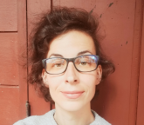Another Fish Hits the Deck.
It is not like a boat down the river,
tranquil. There is no little house, no
paper moon.
I talk a lot. When I do not, I feel
ashamed. I cannot name the shame.
I cannot bear to look at it. I am aware
of its nauseating presence behind
my ear, always, its breath
on the back of my head. No,
I do not know what it says; I do not want
to know; I do not want to be forced
to bear the burden that was forced
upon the people before me,
all I want is: to sleep.
To have nothing to do with it.
I do not want to count the houses
passed along the way. I do not want
to tell the children how I missed
a train, forgot to lock a door,
left a songbird behind, I am
tired.
You can have my suitcase. You can
have my children, their name. You can
have everything under the silent
eye of the sky,
who did not part the sea,
who did not stop the train,
who did not burn the house,
who did not hold the hand
back.
__
The Cartographer
But our family’s luggage, a box here and
a box there, and – who will attend to it?
I have begun to draw a map, based on
their incomplete coordinates: “North”,
“Germany”, “a little to the left”, “a ditch
in a forest”, “black trees”, “anywhere
else”. It does not help, how they switch
names and alphabets. Where is it now,
the bundle tied and left behind? What
was in it, is it worth reclaiming?
Self-addressed, the parcel is returned
about a century too late – I cannot read
the name, the preserves all rotten,
something rancid has leaked all over
the papers. I cannot translate names
from series of numbers. I wish, so hard
it makes me nauseous, but here it is,
the ugly truth:
none of it is usable in any way.
__
The Oranges We Grew
While, buried at the back of my old
mother’s house, my heart calls for
the skeleton which I have walked
over the continent. And split open,
the bone aches but cannot return.
My children, playing in a language
new to me. The schoolteacher’s smile
translated into: we would like to learn
more about your culture. I see no point.
The ritual is such: every morning, before
the house wakes up, I roast coffee – my
father’s way – attempt to remember
the song. But the words now stolen:
they drowned before reaching the shore.
And was it really oranges we grew?
Memory lapses. I am beginning to run
out of interest for the old storyline. I sit
on the sofa, being no-one, wondering
why
I got into that car in the first place.
__
See How We Travel?
The only one who sits is the one who
misses the one now departed. There is
no other way. You are either: taken away
or left behind. The whole family tree
can be divided thus: this one departs;
and that one sits. The one who sits
does the crying, while the other one
dies – tumble, tumble, we trickle down
to the left, to the right. This one strides
his great boot across the plain; he grows
a nose for saffron and camels; he prays
with an ear to the wind. That one has
his throat cut; he will no longer farm.
This one has made it to the sea, and
what else can he do but sit, while his
brother walks a fishnet into the tide,
and dies. But see: history lurks
behind the church, now the sitter is made
to walk and make a living in the capital.
No sooner does he sit, that his son is
walked to some frontline or other – and,
well, shrapnel. I begin to lose count: is it
my turn? Am I a sitting or a walk? A walk,
it seems. I walk across the Atlantic, and
back, around, and all the way to where
my grandmother began, and I know this:
every time I fall to the ground, hoping
that it will be the last – I am reborn.
__
Dandelions, If We’re Lucky.
Black and white, dripping red paint,
we know of many ways to build
a road: from bricks, from bombs –
your blood is our tar, our mortar, supper;
any body will do: we all
look the same, underground.
The family – yours, mine, every
clothesline dripping the same, if you care
to take a closer look: a name and two series
of numbers in a book – sometimes,
some timelines need to be shortened:
we can’t all live where we were born.
And if by miracle, some years later,
you find the place again, here is a dagger
for your heart, that says: gone, gone,
gone. What did you think? That we
would wait for you? That someone kept
your baby books, your cat? We are the same
that murdered your brother. We love not
not our neighbours but the road,
the road – sing to it, now – the road!
that flattens bodies into the landscape,
and grows us into
dandelions, if we’re lucky.
__


























0 Comments